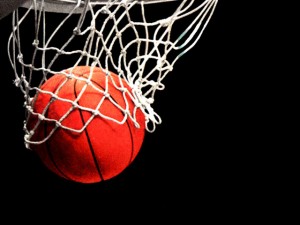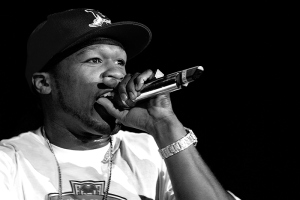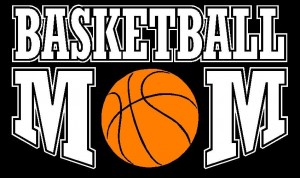“We Ball Harder”: Talking About Sports, Race, Gender, and Pleasure
By Tamura A. Lomax, David J. Leonard, Darnell L. Moore, Heather Laine Talley, and Monica J. Casper
 A few months ago, at the exhilarating height of college basketball season, the university at which one of us teaches won an important game. Right after the big win, the university’s Facebook page screamed, “We Ball Harder!” The comment received hundreds of likes and comments, including some discussion of—and enthusiasm for–balling harder. Surprisingly, nobody seemed to notice that the phrase “we ball harder” might connote a certain flavor of masculine sexuality.
A few months ago, at the exhilarating height of college basketball season, the university at which one of us teaches won an important game. Right after the big win, the university’s Facebook page screamed, “We Ball Harder!” The comment received hundreds of likes and comments, including some discussion of—and enthusiasm for–balling harder. Surprisingly, nobody seemed to notice that the phrase “we ball harder” might connote a certain flavor of masculine sexuality.
This seemed somewhat problematic, and so a higher-up at the university in question was promptly contacted via email. This official, in charge of marketing, wrote back: “I totally agree with you about that headline. I spoke with _____, who is the assistant VP for University Communications. Facebook happens on his watch. I shared my concerns with him but so far the headline remains. If you feel strongly about it, I suggest you email him directly.”
No direct email was sent to the VP for University Communications, for a variety of reasons including the strong likelihood that nothing would come of it on a campus that values its sporting teams. But the incident prompted one of our engaging, provocative behind-the-scenes-at-TFW email conversations.
Take a look…
Tamura: I get the problematics. However, I think there is complexity for me here in terms of the usage of language and image. So this is sexist as hell, on one hand. Very. However, I’m thinking it’s a teaching opportunity, on the other. Language is so tricky. It’s so damn unstable. I have two boys who are avid “ballers.” Not only do they play on teams, they are good! They both play three grades up–against other boys twice their size (literally, sometimes over six feet). This is what makes them “ballers,” which I believe is AA slang, as opposed to simply bball players on a team. To be a “baller” is to be chiefly skilled at handling the ball. This can be sexist, depending on how it gets read, but not necessarily. And “balling” isn’t gendered. It’s most often a compliment. So, I’m wondering if there’s a way to say something here that acknowledges the fluid nature of language while critiquing everything else (e.g. balls/home team/hard v. visiting team/soft).
I’d love to engage further here. Perhaps we can also bring David [Leonard] and Theresa [Runstedtler] into the conversation since each do work on sports. I really have difficulty here. My boys love sports, namely basketball and football. They’re athletes. I see where they gain so much from it. More than we can give them, truth be told. And because they’re black boys with talent in private (mostly white and wealthy) schools, much of their identity is constructed in athletic spaces–because they’re often made invisible until their athleticism is revealed. Yet sports are dangerous, marginalizing, macho, etc. etc. I always enter the sporting arena conflicted…
David: Lots of meaning here; “balling” is a common hip-hop expression, if that adds anything to discussion. Tend to think of it as any instance where someone is excelling, dominating, and otherwise securing excellence. To me, it is about mastery. So when I think of the term and its origins on the basketball court, I think of someone who is so entrenched in the game, who is in the zone that she/he has become at one with the ball itself; mind and body both working in concert with the ball so much so that the player is the ball. Given the ways that sports profits and promulgates from destructive forms of masculinity, and the sexualizing that takes place on and off the court, its usage needs to be considered. I say this especially in terms of advertisements whereupon the layers and the linguistic history are seemingly erased.
Darnell: Thanks for sharing your thoughts, all. I’ve been trying to think through my response, but what you’ve written captures my sentiments. “Baller” is a term with varied meanings, for sure. It is used in the way that you described and as a term used to describe those “ballers” flowing in cash and other things (thinking of 50 Cent’s song on “balling”). 
And, as you’ve noted, in the sports context it is used to describe those with skills. I’m thinking of my nephew here…folk use it to describe his talent on the court. 🙂
It’s interesting, though, to think about the ways “balling” can also be read as a gendered descriptor…and in the case under discussion, a potentially sexist one. I think a conversation on “balling” as a contested term with varied meanings (and, therefore, multiple ways it is read and felt by others) is useful.
Monica: This is interesting, all of you. “Balling” is a nuanced term, and I love your thoughts, Tamura, about your sons’ athleticism and interest in balls…I like the idea of this as a teaching opportunity.
Tamura: The other thing I just thought about is that “balling” (in terms of sports, because it has others meanings as well) also represents socio-economic transcendence. It’s often believed to be a “way out” and a way of acceptance for many inner city and rural youth, regardless of race or gender.
David: Tamura, most definitely. When we talk about a “baller,” we are often talking about someone who has secured a level of wealth or at least is flossin with the right sort of material possessions. It is interesting to think about how the two spaces that it is most used – rap and sports – are also celebrated as spaces where the American Dream is increasingly possible.
Heather: Layers of meaning, for sure. The complexities of “baller” are critical for making sense of what is happening here, and I’m appreciative especially to hear some about your boys, Tamura!
When I look at this, it’s the “We _______ Harder” too that conjures masculinity and sexuality in potentially problematic ways. It’s hard for me to zero in on this exactly, but my initial reaction is that this branding construction only works because it plays on notions of, for lack of a better word, fucking–and a particular kind of fucking at that. Given its reference in relation to a site of masculine athleticism and the always persistent problems around college athletics, sexual violence, and the intersections therein that work to cultivate a kind of hegemonic masculinity, there’s an issue for me with this brand regardless of whether they use “baller” or not.
Maybe I’m having my own Freudian moment, but there’s a lot going on here.
Monica: I love this dialogue. It seems so important to have these open-ended conversations that don’t actually seek resolution but rather raise questions—as with our conversation about violence.
Tamura: It’s an interesting and necessary conversation, I think. I’ve always felt conflicted over being a feminist sports mom, especially when the boys are playing football. It seems to have more contradictions than other sports. Football is extremely masculine. So…it’s like having two heads at times, and I cannot reconcile the two. I’m the mother who’s raising feminist conscious sons who also runs along the sidelines, yelling at the top of my lungs when my “baby” makes a touchdown or shoots an unexpected three pointer during basketball season! In these moments, and at this age, I’m a proud momma who happens to be feminist, too.
 Simultaneously, I understand how masculinity (and ultimately sexuality)…and race…and class are being constructed, too. There’s a lot here. And these private-school programs are a whole different animal. Typically, the coaches (and each team has at least 3-4) are former professionals or Division 1 players, so they are not only intense but highly visible. Scouts are always present, especially at the high school level. And the facilities are on par with many universities. I will never forget visiting my eldest son’s football practice and seeing him surrounded by grown white men, some of whom were varsity coaches, with cameras. I was livid!! They somehow “heard” about his speed and wanted to send footage of him to some professional athlete. Of course, my eldest thought it was a compliment and way cool, as they shamelessly asked him to sprint, jump, catch, etc. It was like a scene from Mandingo!! Needless to say, it ended immediately.
Simultaneously, I understand how masculinity (and ultimately sexuality)…and race…and class are being constructed, too. There’s a lot here. And these private-school programs are a whole different animal. Typically, the coaches (and each team has at least 3-4) are former professionals or Division 1 players, so they are not only intense but highly visible. Scouts are always present, especially at the high school level. And the facilities are on par with many universities. I will never forget visiting my eldest son’s football practice and seeing him surrounded by grown white men, some of whom were varsity coaches, with cameras. I was livid!! They somehow “heard” about his speed and wanted to send footage of him to some professional athlete. Of course, my eldest thought it was a compliment and way cool, as they shamelessly asked him to sprint, jump, catch, etc. It was like a scene from Mandingo!! Needless to say, it ended immediately.
Still, I cannot ignore the pleasure my boys receive from competitive sports. They love physicality. Any kind. I’ve got to nurture that.
What of the politics of personal pleasure?




18 Comments